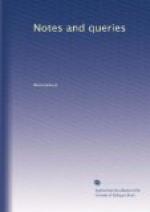A.G.
Ecclesfield, Feb. 8. 1850.
* * * * *
MISCELLANIES.
M. de Gournay.—The author of the axioms Laissez faire, laissez passer, which are the sum and substance of the free trade principles of political economy, and perhaps the pithiest and completest exposition of the doctrine of a particular school ever made, was Jean Claude Marie Vincent de Gournay, who was born at St. Malo in 1712, and died at Paris in 1759. In early life he was engaged in trade, and subsequently became Honorary Councillor of the Grand Council, and Honorary Intendant of Commerce. He translated, in 1742, Josiah Child’s Considerations on Commerce and on the Interest on Money, and Culpepper’s treatise Against Usury. He also wrote a good deal on questions of political economy. He was, in fact, with Dr. Quesnay, the chief of the French economists of the last century; but he was more liberal than Quesnay in his doctrines; indeed he is (far more than Adam Smith) the virtual founder of the modern school of political economy; and yet, perhaps, of all the economists he is the least known!
The great Turgot was a friend and ardent admirer of M. de Gournay; and on his death wrote a pompous Eloge on him.
A Man in a Garret.
Cupid Crying.—“Our readers will remember that some time since (ante, p. 108.) we copied into our columns, from the ’Notes and Queries,’ an epigram of great elegance on the subject of ‘Cupid Crying;’ the contributor of which was desirous of finding through that medium, especially established for such discoveries, the original text and the name of its author. Subsequently, a correspondent of our own [ante, p. 132.] volunteered a translation by himself, in default of the original. The correspondent of the ‘Notes and Queries’ has now stumbled on what he sought, and is desirous that we should transmit it to the author of the volunteer version, with his thanks. This we take the present means of doing. Under the signature of ‘Rufus,’ he writes as follows:—’In a MS. book, long missing, I find the following copy, with a reference to Car. Illust. Poet. Ital. vol. i. 229, wherein it is ascribed to Antonio Tebaldeo—
“De Cupidine.
Cur natum caedit Venus? Arcum perdidit.
Arcum
Nunc quis habet? Tusco
Flavia nata solo.
Qui factum? Petit haec, dedit hic;
nam lumine formae
Deceptus, matri se dare crediderat.”
“Since printing this communication from ‘Rufus’ we have received the same original (with the variation of a single word—quid for cur in the opening of the epigram) from a German correspondent at Augsburgh. ‘You will find it,’ he says, ’in the Anthologia Latina Burmanniana, iii. 236, or in the new edition of this Latin Anthology, by Henry Meyer, Lipsiae, 1835, tom. ii. page 139,




